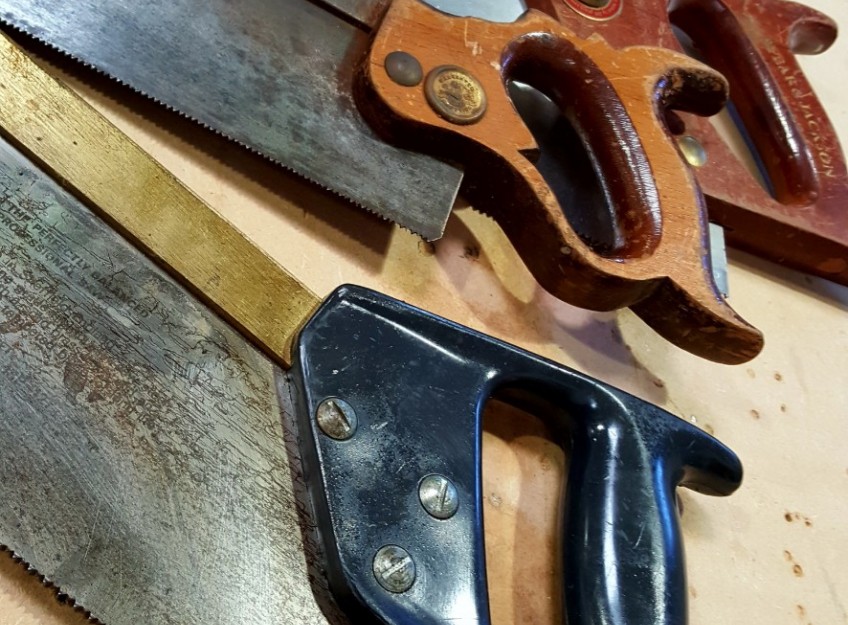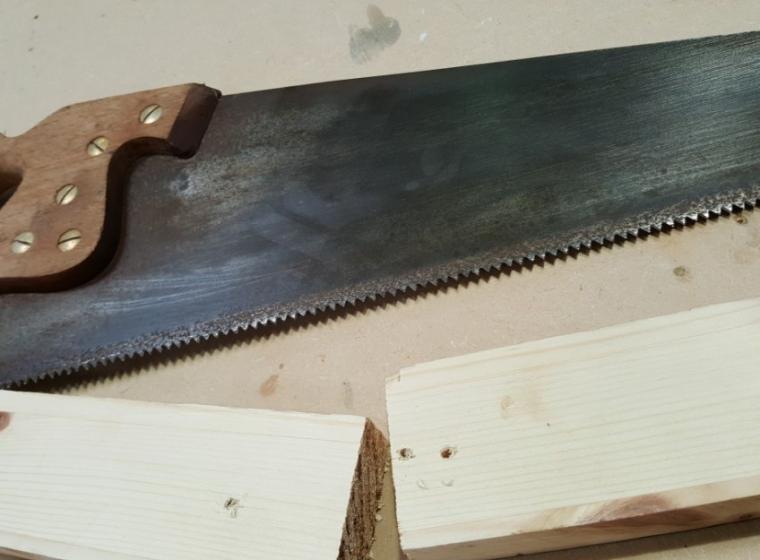Sharpening Saws - The Truth

If you have a hand saw that requires a sharpen, we can help you. The charge per saw is about £8.00+vat, but that is based on condition. If possible it is best to drop them off in person, let me have a look at them for you and we can take it from there. If your saw is in bad condition the charge could be much higher or I might even consider recommending you to a company that could be prepared to remove the teeth and start again should the condition be very poor. I've not accepted saws by post before and would be reluctant to do so, especially when you factor in the courrier charge, it could easily be another £10.00 or £15.00 added to the cost of sharpening.
I'm lucky, I can sharpen my own saws. It's not too difficult, like anything it just takes a bit of practice. My tip would be to purchase a cheap, junk saw with big teeth and practice. With a bit of time, you should be able to sharpen a rip saw and when competent with that, you can try your hand at a cross cutt. Most good woodworking books, pre 1970's usually have a good description somewhere within about how to do it. The video below is a good place to start if you want to see the process in real time (my ony tip, drop the "micro bevel", in my experience it's an extra step that's not worth the time and adds nothing to the sharpness). You'll need some supplies too. In my experience, Workshop Heaven have the best selection of relaible sharpening gear. Buget on spending about £50.00 to £60.00 on sharpening gear.
I feel saw sharpening is a very worthwhile thing to learn, it opens doors to a world of quality tools that could easily be dicarded. Good, old saws can be found for very little. Are there other options though? Well yes, there are a couple worth looking into. First up the modern hardpoint saw. They come in all shapes and sizes, they are nearly always sharpened for cross cutt but can also rip one inch and less pretty well. For the professional arena of woodworking, these are now the dominant form. They are very good value, you can purchase a hardpoint for less than my sharpening service and it'll stay sharper longer too. Just because they are good value does not mean they cut poorly, in fact they cut very well and there is a range from fine to coarse depenting on your work. You'll need to treat the good value harpoint with just as much respect as you would any other tool to get the best out of it. They also score high on working with abrasive materials such as Plywood, MDF, Chipboard and Plastics. Sure, those materials are not much fun to work with but they are going to be with us for a while and they destroy old saws, in fact you'd spend more time sharpening than using if you used them on a modern building site. The down site is the waste, the hard teeth are near impossible to sharpen cheaply. I wish it was possible to buy one handle and then just by saw blades as required.

Next option is the Japanes pull saw. Very effective tools, I like them well enough and have found no issue in use, I just personally prefer western style saws. Again, you wont go wrong with Workshop Heaven for your Japanese saws. The only cost effective options here are dispossable style saws. But as with other hardened teeth, they last a very long time.
So why did I call this post "Sharpening Saws - The Truth". I did so, in the hope that those starting out might get some balance on what might suit them best. Here are my list of "truths" :)
1) If you find you're on a construction site for much of your time, go for a hardpoint and take care of it. The truth is you'll have to work with abrasive matrials and they'll ruin good old saws.
2) If you're in a workshop you can go whichever way you want. Most modren workshops would rip nearly all matrial with the help of a machine. This is nothing new, it was a common thing in most worshops during the early 20th century. This means cross cutt is the most helpful here.
3) If your work is not for pay then do whatever you want. I would encourage you to take a look at saving some old saws and use them. They are really effective and in a small home workshop they work great, especially when access to machines is difficult or impossible.
4) Buying hard point saws does not mean you conspired with manufacturers and bought into a wastefull culture. Sound like an odd statement to make? Trust me, it does seem to be fasionable to bash the trades these days and it's not uncommon to read all kinds of stuff about how we don't care about things any more. Nothing could be further from the truth!
5) Try a decent hardpoint first, even if you want to restore a saw. It'll be a good barometer for how your getting on.
I have no more "truth" left. However, I have sharpened one clients crosscut handsaw. It'll now be ideal for breaking down planks or cutting joist and studwork. Just the other three to go once my files get here.

